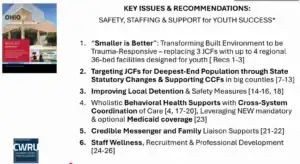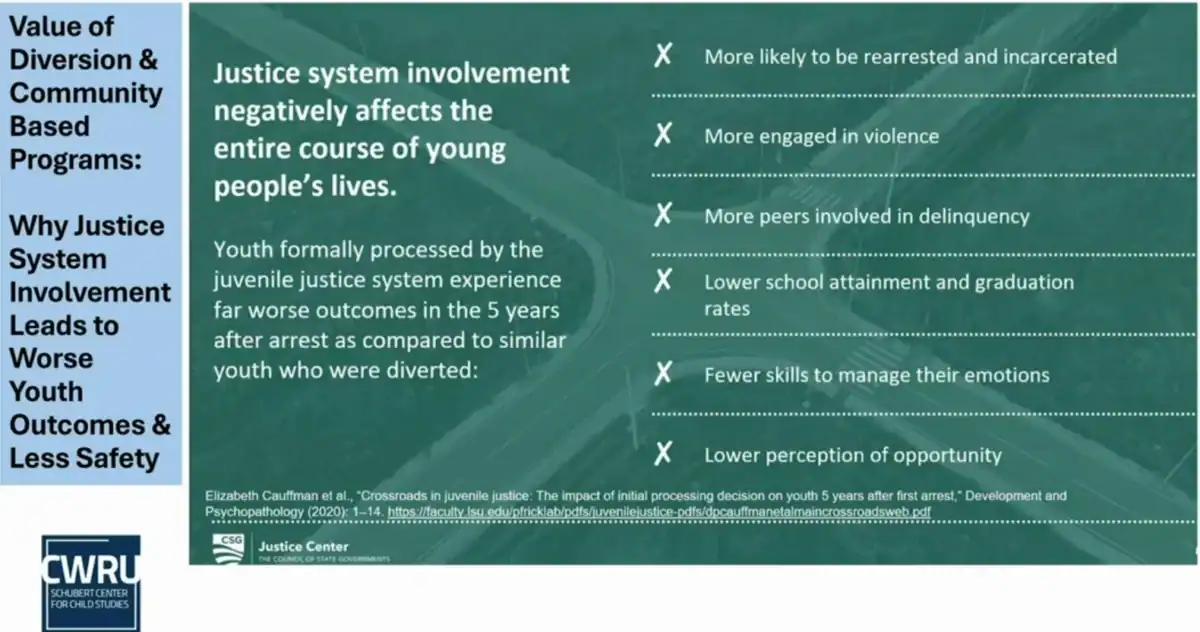By Angela Hay
In December 2022, more than 300 people gathered at Olivet Institutional Baptist Church to discuss their concerns about juvenile justice in Cuyahoga County. More than two years later, community leaders are still waiting for the Cuyahoga County Council to make substantial changes. The Juvenile Court Advisory Subcommittee released a detailed list of recommendations at the end of May 2025, but no action has yet been taken by the County.
Community Concern Demands Response
The gathering at Olivet Institutional Baptist Church was driven by a growing sense of urgency around juvenile justice in Cuyahoga County, specifically focused on the justice system’s interactions with Black youth.
According to the Juvenile Court Advisory Subcommittee, Black children comprise only 42% of the juvenile population in the county, but represent 90% of the detention center population.
Black youth are also disproportionately affected by discretionary juvenile bindover, in which a judge chooses to transfer a minor to be tried and sentenced as an adult. Cuyahoga County has the highest number of bindovers in the state, four times more than the next highest county. Black youth comprise 94% of these bindovers.
Two years after this initial gathering, articles published by the Marshall Project and the Cleveland Plain Dealer drew additional attention to the community’s concerns.
The Juvenile Justice Subcommittee
The Cuyahoga County Council formed a subcommittee to study these issues in April 2024. Their mission, per the recently released report, was to “conduct a comprehensive review of existing programs, program outcomes, and rates of recidivism within Cuyahoga County’s Juvenile Justice system and to submit findings and recommendations upon the completion of its work.”
The professionals chosen for the subcommittee all have extensive experience in justice reform and deep roots in Cleveland communities. They include:
- The Honorable Ronald Adrine. He has been practicing law since 1973 and has worked on multiple projects involving racial justice, family justice, and domestic violence. Notably, in 2015, Adrine was responsible for filing an administrative order stating that there was probable cause to charge the two police officers involved in the Tamir Rice case.
- Marvin Cross, a retired Cleveland police commander.
- Bridget Gibbons, the Juvenile Court Deputy Court Administrator at Cuyahoga County Juvenile Court
- The Honorable Robert McClelland, who practiced law for 30 years and acted as a judge for nine years. He retired in 2020 and is currently described on his LinkedIn page as a “mediator.”
- Jennifer Blumhagen Yarham, the Executive Director of Applewood Centers, Inc., a residential treatment program for girls with behavioral problems
Before starting the process, both Cross and Adrine expressed concerns about whether their recommendations would be seriously considered and acted upon by the County Council.

The Subcommittee’s Final Report
After nine months of public meetings and data collection, the subcommittee released a 37-page report containing its findings, recommendations, and observations.
The report describes the impetus for the subcommittee as a combination of community activism, in-depth reporting, and media attention, which the report summarizes as “public clamor.”
Recommendations: Funding
The subcommittee’s recommendations span nine categories. The primary focus, however, is funding. Action items include $1 million for “community-based alternatives to detention” and an unspecified amount of additional money for early intervention, restorative justice, vocational activities, and therapy.
The subcommittee recommends funding Care First Cuyahoga, described by Cuyahoga County as “a continuum of care to divert youth from the juvenile justice system into community-based alternatives.” The Cuyahoga County Juvenile Court was granted $450,000 in May 2024 to design this program, but money does not yet exist for its implementation. The report indicates that the final cost will be determined when planning is done. No public update has been made about the completion of that initial stage.
An additional $1.2 million is recommended for hiring probation officers, which would reduce the caseload from 31 youth per officer to 20. A 2020 study indicated that incarcerated youth are 33% more likely to reoffend compared to youth kept in the community, making involvement with probation officers a priority.
Funds in unspecified amounts are also requested for mental health services, teams to reduce racial disparities, community-based correctional facilities, and elements of RECLAIM Ohio, whose mission reads similarly to Care First Cuyahoga.
Recommendations: Social Justice
The subcommittee also recommends tackling issues of injustice in a section titled “Advancing Racial Equity and Inclusive Practices.” While the other sections name specific programs and organizations that should be supported, this section takes a higher level approach. The action items encourage the County to “fund multidisciplinary teams to reduce racial disparity” and “address systemic discrimination.” No specific plans are listed as to the accomplishment of those goals.
Recommendations: Gun Violence
The report includes statistical information about the increase in gun violence and gun-related offenses in Cuyahoga County. They note a 17% increase in homicides, a 12% increase in aggravated robberies, and a 31% increase in improper handling of a firearm, all by juvenile offenders.
In response, the committee says, “The County should adopt a public health approach to reducing gun violence among youth.” The Committee encourages the County to “recognize social determinants” and “strengthen social and economic protective factors.” This section also includes another call for direct funding to the RECLAIM program.
Response to the Subcommittee’s Report
Per Cleveland.com, the final report was submitted to the Cuyahoga County Council Public Safety and Justice Affairs Committee on June 17, where it was discussed for roughly 20 minutes.
“I’m eternally grateful to you and the committee for doing what you did,” Councilman Michael Gallagher said. “Now the work begins. Now the heavy lifting begins, and now that’s on us, and let it be. So we stand ready to help you.”
Councilman Gallagher indicated that the subcommittee’s recommendations would be revisited when the Council looks at the budget in October.
The Cleveland Observer contacted several organizations involved in the original community meeting for their thoughts on the completed report, but did not receive a response in time for this publication.




